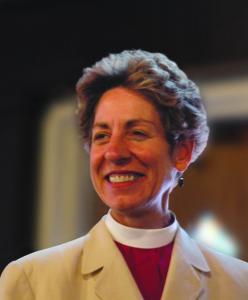Earlier this week, The Rt. Rev. Katharine Jefferts Schori, the former Presiding Bishop, spoke as a part of the Women at Kenyon celebration. As reported by the Kenyon Collegian, her address centered on “women, power, and the fight to be recognized.”
“It’s easier to be creative when you don’t sit in the midst of the status quo,” Jefferts Schori said. “Without access to traditional seats of power, women and marginalized people have had to be creative. Creativity asserts that transformation is always possible, even if we haven’t yet figured out how.”
In the Q&A that followed the speech, one student, Sophie Mortensen ’20, wondered whether Jefferts Schori would advise someone to follow in her footsteps.
“What advice would you be able to give to someone—say, a young college student—who is discerning a vocation in religious leadership?” Mortensen asked.
“Keep discerning,” Jefferts Schori said. “[Religious leadership is] a place where you can be in a relationship with people in a way you can’t always in a more secular workplace. It’s a place where you can hold up those ancient dreams and point to where we can make a difference.”
In response to a student’s question about the role of social media in developing the s0-called “cancel culture” (where ostracizing and/or shaming a person with different views is normative), Jefferts Schori acknowledged that,
… the Episcopal Church had faced similar problems. She blamed at least part of the issue on the anonymity provided by technology.
“The nastiness in the Anglican communion 10, 15 years ago started on the internet, when people could blindly put out information that was untrue,” Jefferts Schori said. “Perhaps [that’s] why I continue to say that face-to-face [communication] is really important … Face to face, we have to see a human being. In the Abrahamic tradition, it’s the image of God in our neighbor.”

